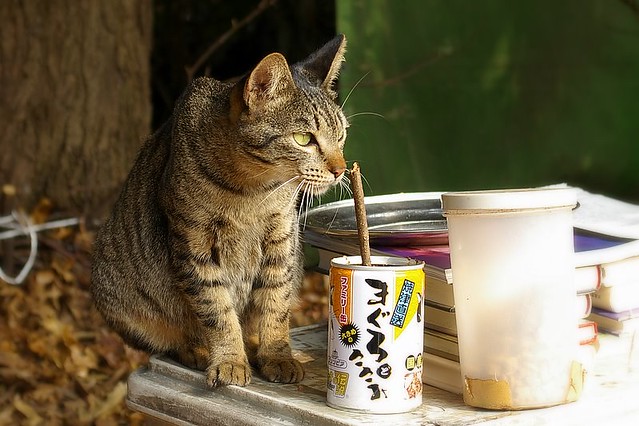A thin, dehydrated cat presents to the clinic with the complaint of malaise, inappetence, and weight loss. I tent his skin and watch as I let go, the gummy flap at the nape of his neck sitting still instead of snapping smartly back in place. His breath has the sour smell a vet might describe as “uremic”, common in cats with renal failure as the kidneys are overwhelmed with their job of filtering waste from the blood. Bloodwork confirms what we suspect: this older cat is in kidney failure, and despite the amount of supportive care we have to offer, the bottom line is this: it’s an irreversible disease.
All diseases have their share of distress and frustrations; in feline medicine, renal disease is one of the worst. It’s one of the most common conditions we see in older cats. Although there are specific, known causative agents for some types of renal failure, things like toxins, autoimmune disease, and infection, much of the time we have no idea what causes it. As the kidneys lose function, a litany of unpleasant secondary issues develop: hypertension, anemia, ulcerations, vomiting. Owners do what they can to stay on top of the symptoms with administration of fluids, special diets, and medications, but the overall course is frustrating, uncomfortable, and challenging for both the pet and the owner.

So it was with great interest that I read this abstract from the Proceedings of the National Academy of Sciences, out this week: “Feline morbillivirus, a previously undescribed paramyxovirus associated with tubulointerstitial nephritis in domestic cats.” That’s the actual abstract for the bio-nerds types like me who like reading about paramyxoviruses. For those thinking, “huh?” Stephanie Pappas at LiveScience does a great job translating the study and its implications.
 To summarize the summary, a group of researchers in Hong Kong went on a hunt for a feline morbillivirus, a family of viruses known to infect humans (measles, mumps) and dogs (distemper.) In a study of 457 stray cats, the virus was found in 12%. So to answer the first question, does this virus exist in cats, the answer is yes. Then they asked, what body systems does it affect?
To summarize the summary, a group of researchers in Hong Kong went on a hunt for a feline morbillivirus, a family of viruses known to infect humans (measles, mumps) and dogs (distemper.) In a study of 457 stray cats, the virus was found in 12%. So to answer the first question, does this virus exist in cats, the answer is yes. Then they asked, what body systems does it affect?
Here’s where it gets interesting: “A case-control study showed the presence of TIN (inflamed renal tubules) in seven of 12 cats with FmoPV infection, but only two of 15 cats without FmoPV infection (P < 0.05), suggesting an association between FmoPV and TIN.”
Translation: The researchers examined 27 stray cats who had passed away from various causes. Of 12 who were positive for the virus, 7 had signs of kidney damage (58%). Of the 15 who were not positive for the virus, only 2 (13%) had kidney damage. And if I read the abstract correctly, they were further able to isolate viral protein within the kidney cells themselves. Heady stuff.
So we’ll see- if it does turn out that this virus is one of the causes of renal disease in cats, the implications could be big. We have vaccines for measles, mumps, and distemper. The idea that one day in the future we may be able to vaccinate cats and save some from that horrible spectre of death by renal failure is one that fills me with joy.
So rock on, researchers. Pursuing a PhD in a biological science was something I considered at one point, but the truth is I was never possessed of the right temperament for that job. I’ve never been one with the meticulous nature and attention to detail needed to do what they do, but man, when I hear stories like this, I am so glad that someone else does.






Wow! That would be wonderful. As one of those owners who has gone through giving fluids, supplements, prescription diet, etc, I was able to give my cat Zeke, about an extra four years. Then last fall when my poor sweet Ally went into renal failure it was just too fast and that wasn’t an option. How wonderful if there was a chance that a vaccine could be discovered that could prevent at least some cases.
Oh, this would be fabulous!
That is super interesting. Thank you for sharing. I love that phrase. “Rock on, researchers!”
As mama to two kidney cats, I welcome this research with open arms. Until now, it seems the prevailing thought was that the kidneys just wore out with age, but if it’s related to a virus and some cases can be prevented, that is wonderful news for cats 🙂
That’s hopeful. We caught my cats renal failure early and with the right diet and medication she had many happy YEARS after the diagnosis. The end was tough as hell to see her quickly waste away. If there’s a way to prevent it, it’ll save a lot of heartache.
Years- how wonderful. Such a gift to know about these problems early enough to start interventions.
That would be awesome. There are a lot of people, especially my 90 year old mother-in-law, who would LOVE to find a cure for her cat!
Oh, wow. We just lost our cat to renal failure, and we’re in the process of watching my mother-in-law’s cat go through the same thing. It would be AMAZING to be able to do something more about it than just keep them as comfortable as possible.
nice picture